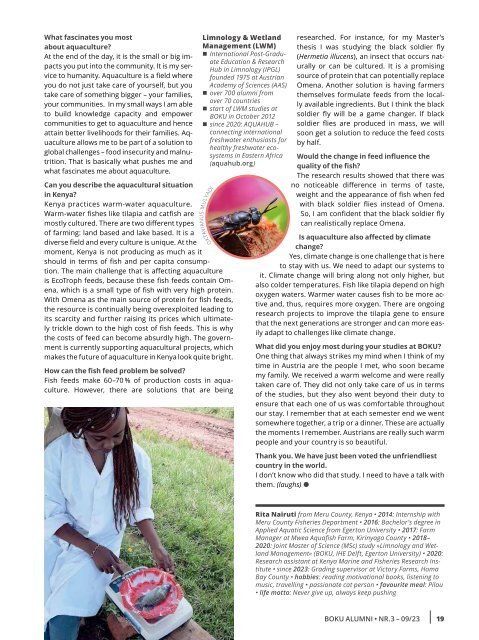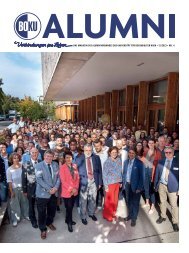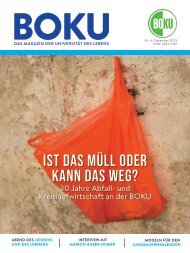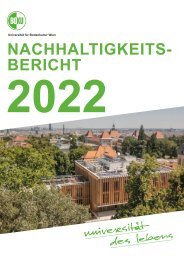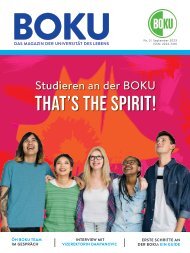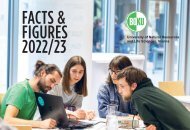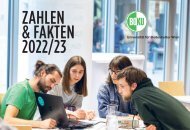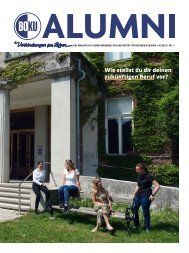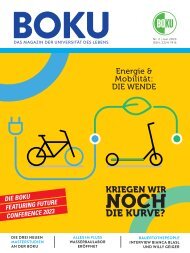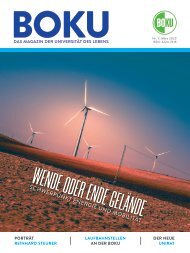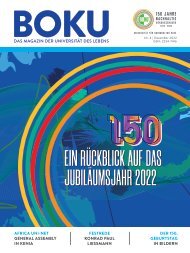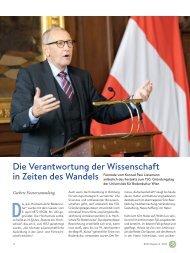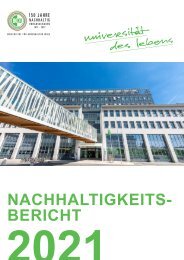ALUMNI Magazin 3/2023
Sie wollen auch ein ePaper? Erhöhen Sie die Reichweite Ihrer Titel.
YUMPU macht aus Druck-PDFs automatisch weboptimierte ePaper, die Google liebt.
What fascinates you most<br />
about aquaculture?<br />
At the end of the day, it is the small or big impacts<br />
you put into the community. It is my service<br />
to humanity. Aquaculture is a field where<br />
you do not just take care of yourself, but you<br />
take care of something bigger – your families,<br />
your communities. In my small ways I am able<br />
to build knowledge capacity and empower<br />
communities to get to aquaculture and hence<br />
attain better livelihoods for their families. Aquaculture<br />
allows me to be part of a solution to<br />
global challenges – food insecurity and malnutrition.<br />
That is basically what pushes me and<br />
what fascinates me about aquaculture.<br />
Can you describe the aquacultural situation<br />
in Kenya?<br />
Kenya practices warm-water aquaculture.<br />
Warm-water fishes like tilapia and catfish are<br />
mostly cultured. There are two different types<br />
of farming: land based and lake based. It is a<br />
diverse field and every culture is unique. At the<br />
moment, Kenya is not producing as much as it<br />
should in terms of fish and per capita consumption.<br />
The main challenge that is affecting aquaculture<br />
is EcoTroph feeds, because these fish feeds contain Omena,<br />
which is a small type of fish with very high protein.<br />
With Omena as the main source of protein for fish feeds,<br />
the resource is continually being overexploited leading to<br />
its scarcity and further raising its prices which ultimately<br />
trickle down to the high cost of fish feeds. This is why<br />
the costs of feed can become absurdly high. The government<br />
is currently supporting aquacultural projects, which<br />
makes the future of aquaculture in Kenya look quite bright.<br />
How can the fish feed problem be solved?<br />
Fish feeds make 60–70 % of production costs in aquaculture.<br />
However, there are solutions that are being<br />
Limnology & Wetland<br />
Management (LWM)<br />
• International Post-Graduate<br />
Education & Research<br />
Hub in Limnology (IPGL)<br />
founded 1975 at Austrian<br />
Academy of Sciences (AAS)<br />
• over 700 alumni from<br />
over 70 countries<br />
• start of LWM studies at<br />
BOKU in October 2012<br />
• since 2020: AQUAHUB –<br />
connecting international<br />
freshwater enthusiasts for<br />
healthy freshwater ecosystems<br />
in Eastern Africa<br />
(aquahub.org)<br />
OKTAVIANUS-MULYADI<br />
researched. For instance, for my Master’s<br />
thesis I was studying the black soldier fly<br />
(Hermetia illucens), an insect that occurs naturally<br />
or can be cultured. It is a promising<br />
source of protein that can potentially replace<br />
Omena. Another solution is having farmers<br />
themselves formulate feeds from the locally<br />
available ingredients. But I think the black<br />
soldier fly will be a game changer. If black<br />
soldier flies are produced in mass, we will<br />
soon get a solution to reduce the feed costs<br />
by half.<br />
Would the change in feed influence the<br />
quality of the fish?<br />
The research results showed that there was<br />
no noticeable difference in terms of taste,<br />
weight and the appearance of fish when fed<br />
with black soldier flies instead of Omena.<br />
So, I am confident that the black soldier fly<br />
can realistically replace Omena.<br />
Is aquaculture also affected by climate<br />
change?<br />
Yes, climate change is one challenge that is here<br />
to stay with us. We need to adapt our systems to<br />
it. Climate change will bring along not only higher, but<br />
also colder temperatures. Fish like tilapia depend on high<br />
oxygen waters. Warmer water causes fish to be more active<br />
and, thus, requires more oxygen. There are ongoing<br />
research projects to improve the tilapia gene to ensure<br />
that the next generations are stronger and can more easily<br />
adapt to challenges like climate change.<br />
What did you enjoy most during your studies at BOKU?<br />
One thing that always strikes my mind when I think of my<br />
time in Austria are the people I met, who soon became<br />
my family. We received a warm welcome and were really<br />
taken care of. They did not only take care of us in terms<br />
of the studies, but they also went beyond their duty to<br />
ensure that each one of us was comfortable throughout<br />
our stay. I remember that at each semester end we went<br />
somewhere together, a trip or a dinner. These are actually<br />
the moments I remember. Austrians are really such warm<br />
people and your country is so beautiful.<br />
Thank you. We have just been voted the unfriendliest<br />
country in the world.<br />
I don’t know who did that study. I need to have a talk with<br />
them. (laughs) •<br />
Rita Nairuti from Meru County, Kenya • 2014: Internship with<br />
Meru County Fisheries Department • 2016: Bachelor’s degree in<br />
Applied Aquatic Science from Egerton University • 2017: Farm<br />
Manager at Mwea Aquafish Farm, Kirinyaga County • 2018–<br />
2020: Joint Master of Science (MSc) study »Limnology and Wetland<br />
Management« (BOKU, IHE Delft, Egerton University) • 2020:<br />
Research assistant at Kenya Marine and Fisheries Research Institute<br />
• since <strong>2023</strong>: Grading supervisor at Victory Farms, Homa<br />
Bay County • hobbies: reading motivational books, listening to<br />
music, travelling • passionate cat person • favourite meal: Pilau<br />
• life motto: Never give up, always keep pushing<br />
BOKU <strong>ALUMNI</strong> • NR.3 – 09/23<br />
19


